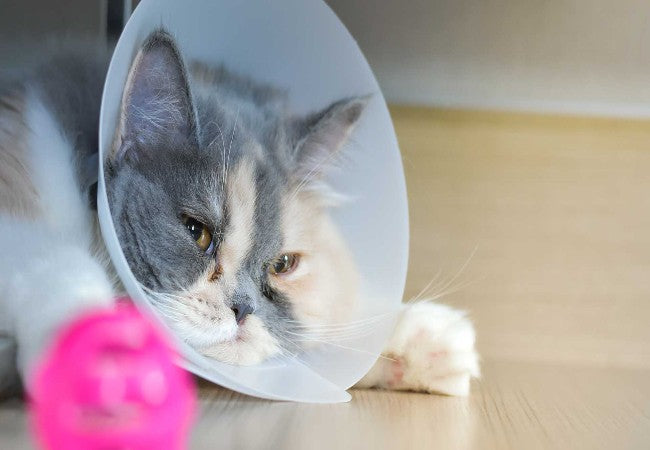A Vet’s Guide: Should I Desex My Cat? Benefits, Risks & Timing (2025) 🐱✅

In this article
A Vet’s Guide: Should I Desex My Cat? Benefits, Risks & Timing (2025) 🐱✅
By Dr. Duncan Houston BVSc
Hello—I’m Dr Duncan Houston BVSc, veterinarian and Ask A Vet founder. Desexing your cat (spaying or neutering) is a major decision that influences health, behavior, and welfare. In this in-depth, vet‑approved guide, we’ll cover:
- 📌 Health & behavioral benefits
- ⚠️ Potential risks
- 🕒 Optimal age guidelines
- 🌱 Hormone-sparing alternatives
- 🛠️ Post-op care and enrichment support
1. What Does “Desexing” Mean?
Desexing (neutering male, spaying female) removes reproductive organs—ovaries/uterus in females and testicles in males—thereby preventing breeding and altering hormone levels.
2. Major Health Benefits
- ✅ Eliminates pyometra, uterine and ovarian cancers in females
- ✅ Reduces mammary (breast) cancer risk by over 90% if done before first heat
- ✅ Prevents testicular cancer in males
- ✅ Decreases risk of diseases spread by fighting, like FIV/FeLV
- ✅ Spayed/neutered cats live longer, with lower bite-wound incidence
3. Behavior & Quality-of-Life Benefits
- ⬇️ Significant reduction in roaming, yowling, and heat-period behaviors
- ⬇️ Spraying and urine marking drop in male and some female cats
- ⬇️ Aggression and intraspecies fights decrease
- ✅ Cleaner, calmer home life, since cats aren’t seeking mates
4. Potential Risks & Considerations
- ⚠️ Weight gain/obesity post-surgery is common due to reduced metabolism
- ⚠️ Early desexing (before 8 weeks) may slightly increase risks for urinary blockages; moderate early desexing (4–6 months) is considered safe
- ⚠️ A small risk of urinary tract issues (incontinence or blockages) post-desex
- ⚠️ Rare development of ovarian remnant syndrome in spayed females—medical attention may be required
5. Optimal Timing Guide
- 📅 Shelter/early desex (8–16 weeks): Effective for population control, safe with minimal complications
- 📅 Standard timing (4–6 months): Balances surgical ease and maturity; prevents first heat
- 📅 After first heat (>6 months): Generally acceptable; may slightly increase mammary cancer risk
- 📅 Desexing a cat in heat: Possible but more complex; consult your vet if urgent
6. Alternatives: Hormone-Sparing Options
Consider tubal ligation or vasectomy if you wish to prevent pregnancy but preserve hormones and behaviors. These options are less common but available and may maintain a cat’s natural hormone balance.
7. Decision-Making Framework
- 🔍 Clarify your goal: population control, health protection, behavior modification, or breeding
- 🍀 Assess cat-specific factors: sex, breed, indoor/outdoor lifestyle, behavior patterns
- 🗓️ Choose timing: early for shelters, standard 4–6 months for most
- 🌿 Explore hormone-sparing alternatives if concerned about hormone loss
- ✅ Use Ask A Vet telehealth for personalized advice on timing, procedure choice, and follow-up
8. Post-Op Care & Support Tools
- Ask A Vet App: Enables checklists, incision monitoring, and remote behavioral support post-surgery
9. Real Vet Case
Case: Luna, indoor female tabby
Luna was desexed at 5 months—before her first heat. Neighboring intact cats had been fighting near the house, so keeping her calm and indoors was vital. Using Ask A Vet telehealth, Luna’s owner got guidance on incision care and preventing weight gain with controlled meals helped ease stress during her quiet recovery days. Luna healed well and hasn’t shown any unwanted behaviors since. 🐱💕
10. FAQs
-
Will my cat change personality?
No—desexing removes mating instincts but core personality remains. -
Should I wait until she has a litter?
No—there is no medical benefit for breeding before spaying; early desex reduces cancer risk. -
How much will it cost?
Typically $150–$300, depending on clinic details and whether bloodwork is included.
📌 Final Thoughts from a Vet
Desexing is one of the most impactful decisions you can make for your cat’s health, behavior, and welfare. The benefits—cancer prevention, calmer disposition, safer lives—generally outweigh the minimal risks, especially when timed and executed thoughtfully. With tools like Ask A Vet telehealth, you can ensure a smooth, informed pathway for your cat in 2025 and beyond. 🐾❤️






